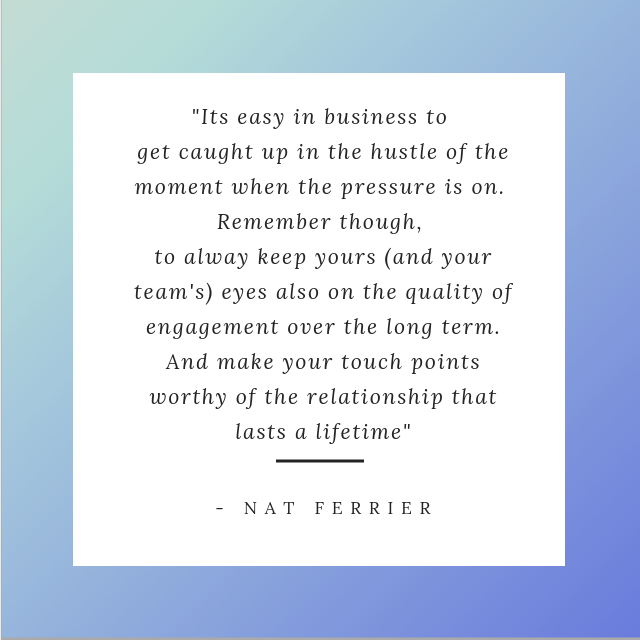And I find there is generally one of three main reasons disengagement is occurring. They are that either:
1- The Need for Reconnection Very commonly, especially in organisations or businesses big enough to have multiple parties responsible for different functions in the chain of service to the client, a simple breakdown in communication has occurred, that has not yet been recognised or addressed. The reasons why that has developed can be numerous. Whatever the reasoning for why either party has not been in touch though, one of the first steps in world class customer service, maintaining a relationship with the client and (for you) retaining their business, is to have a representative of your organisation reach out to the client to touch base and find out where they’re at, by asking them how they are or just where they’re at. Best case scenario, maybe they’ve been flat out and you were literally next on their list of things to do and you just got in first (which makes you look like you care and are proactive), worst case scenario, maybe there was just a family, life or financial crises (and they haven’t yet been able to reach out…and possibly feel a bit awkward or embarrassed about doing so). Or very commonly and far milder in severity, maybe a new need has arisen for them and they’re presently in a state of reconsideration of wether the existing service agreement and service is still a fit, and or considering what they need to communicate with you in order to adjust it. Or whether they might need to go elsewhere. My point though, it’s not weirdly stalker-ish, or overzealous, “chasing” or inappropriate for someone from your organisation to reach out and ask how the client is doing in such an instance. It’s actually high quality customer service, that shows that you genuinely care and you see it that you are in this together. And it’s so often the simplest of all first steps in getting things successfully back on track. 2- The Need to take Responsibility Secondly, very often when I have been that person reaching out on behalf of an organisation, I’ve found that the service provider has, somewhere within the chain of service, or in communicating information between the links in the service chain, dropped the ball in delivery of the promised service in some way. In which case, as the designated representative of the company in that moment, it becomes your job to be the front face taking initial responsibility for acknowledging the potential occurrence of a mistake, ahead of connecting the parties directly involved in its investigation and, ultimately taking action towards its resolution, in line with the expectations laid out by both parties in the original service agreement. At this point, there might also be a revisiting of how you can improve upon the original agreement and, ideally, you throw in some more value to make amends for your organisation’s part in this . Alternatively, it might come out of a chat that the party receiving the service is not yet delivering on their part of the deal, depending on the nature of the service you provide, and what is required of them. Whatever the reasoning behind this, they too may need to step up and take responsibility for their part in the service agreement. Yes, that might be a bit “totes awks” as a discussion to have. But getting past “totes awks territory”, back to clear expectations of what is required of each party ongoingly (or not) next, in the actualisation of the service agreement, is the goal and the kind of stuff long term client relationships need to thrive. So resolution part 2 involves addressing and re-assigning responsibility. 3- The Need for a Pathway of Re-engagement The final place where disengagement can occur is around “what next’ and simply creating a clear invitation and opportunity around further engagement. Very often, again, one might not have been discussed. Maybe one does not yet exist. But could, if someone from your organisation uses the information gained from the before mentioned chats to create a new pathway of service/delivery of something of value to the client, or continued organisational, or even industry level engagement, that benefits you both. At the simplest level, by asking what do you need now, and how can i/we help you achieve that? And, if they have someone or something in their network, that might also be of benefit to you too, it’s about creating opportunities for discussion in which such possibilities can emerge. However it looks, even if your initial business is complete, it’s about finding clever ways to stay in touch with the people you genuinely really like working with or supporting (and vice versa) over the long term. While it can be easy, when the pressure is on, “survive” kicks in and things and people need to be paid in the short term, to end up chasing our desired outcome, at the risk of losing site of the clients. Or, when you’re overrun busy, it’s very easy to get busy serving the people in the group that yell the loudest and then realise weeks or months down the track that no-one has made time to swing back around to check on the parties that have been more quiet, as to why. My best advice to you though is make sure you always keep the reasons your clients came to you and their needs front and centre in everyone along the chain of services' minds. Plan out a schedule of touch points, keeping managing the above 3 mentioned points in mind. And when you do have to do those "totes awks" AR (accounts receivable) or follow up type conversations, be mindful of the following two questions: How can we do what has to be done for business, in a way that simultaneously demonstrates love, care and genuine concern for the client, as well as shows our commitment to delivering them a world class level of quality service? In the end, people who feel well respected, honoured and supported in having their service needs well met are inclined to stay and want to further grow and keep engaging with you. People who are worried that this might not be it, or that they treat me/us like sh#t, are more inclined to want to withdraw or walk away. And dare I say, question no 2: what do you want your business/organisation to be known for in terms of the client experience and quality of service? How, in action, can you demonstrate that? Every touch point you have along the way is your opportunity to create that. Make sure you make them count. Nat xx |
WriterActress, Artist, Singer, Coach, Facilitator, Speaker, Writer Nat Ferrier talks about self expression, Women’s Leadership Mindset & communicating with greater confidence, presence & psychological safety. Archives
March 2024
Categories |


 RSS Feed
RSS Feed